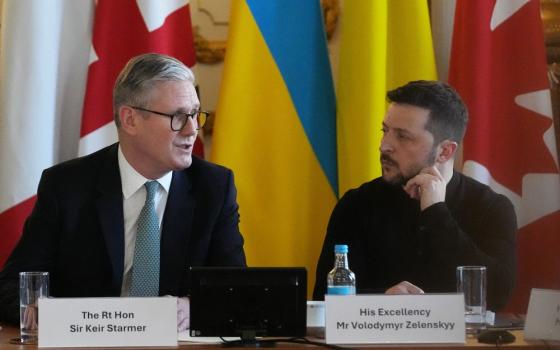For years Catholics and evangelical Protestants have found common cause especially in opposing abortion and homosexual practice, including gay marriage and challenges to Christian privilege. They have also stood together to assert their right to conscientiously object to laws they find morally repugnant.
But does this mean they're friends? Jamie Manson's sharp-eyed piece on the pope's embrace of some of the more visible evangelical figures suggests it is so. If that is the case, it must be a rather narrow version of friendship that collides with the pope's major message in several ways.
Rick Warren , Tony Perkins, Jim Robison and the others identified as Francis' amigos are an unblended lot. They act on their individual agendas (evangelicalism being perhaps the truest form of free enterprise extant) and not only compete for audience but frequently stir mutual friction. They publicly stand four square against shared moral evils, however, and that alone makes for friendships of convenience with official Catholicism. Warren has become the media go-to preacher for his image as the "new evangelical" who shows sympathy with broader social causes like environmentalism, but so far that advocacy has barely shown itself.
The fact is that for all their passion for upholding a cluster of personal, sexual morals, evangelicals ignore or reject almost every element of Francis' agenda. Economic and political justice are not on the evangelical radar screen in any way that reflects Francis' positions. Climate change is a non-starter topic in nearly all their churches. Human rights, except for Christian rights, have no priority. To most evangelicals, wealth never reaches unethical levels, nor does nationalism or the income gap. Francis presumably favors stepped-up state aid to rescue poor people; it is a plea rarely if ever heard in evangelical circles where the focus is on individual salvation and anything like the corporate vision of Catholic Social Teaching is non-existent.
On the other hand, the pope's appeals resonate powerfully among mainline Protestant churches and have for decades. Racial and economic justice, nuclear disarmament, attacking poverty and curbing corporate hegemony have been among the most prominent initiatives among Presbyterians, Episcopalians, Lutherans, United Methodist, the United Church of Christ and the Disciples of Christ, among others, since they awoke anew to social crises during the 1960s and 1970s. They have actually pursued ecumenical unity, another Vatican II highlight, with years of study and conferencing with the Vatican.
Yet probably because they have differed with Catholicism over contraception, abortion and homosexuality, they aren't friended by the pope. Another reason, perhaps, is that the mainliners have lost numerical and societal leverage, losing lots of members (like the Catholic church is now) and relative prestige as establishment churches. They are no longer what's trending or "hot" in the American marketplace where growth and sorts of glamor mean you've got it right. Mainliners, once perched on top, are now lacking that sexy "vitality" that defines American winners. They don't add much luster as friends anymore. Evangelicals are sliding down in the charts, too, but the effect hasn't yet been widely recognized. They still make good friends of convenience when they're needed. They will be on hand before the pope arrives in Philadelphia to root for the old family values, real or imagined, with their Catholic brethren. Their theology, of course, has a history of denouncing the papacy, but no matter.
The camaraderie between the two groups adds to Francis' list of paradoxes. Among them: he is the soul of inclusiveness who endorses sectarians; the espouser of women's potential in the church who has shut the door on women's ordination; the eloquent champion of the poor who is comfortable canonizing Junipero Serra, an alleged abuser of poor, native people; the foe of climate change who has made no public move to end the Vatican's investments in fossil fuel; the herald of justice who mobilizes no activism in the church itself on behalf of those causes.
The scheduling of the Serra elevation suggests a conscious desire to keep exhortation from activism. It will take place on the afternoon he arrives in Washington, in the midst of a day when the overwhelming deluge of the news will presumably reduce its prominence and thereby perhaps diminish the pain and protest from descendants of Serra's forced conversions.



